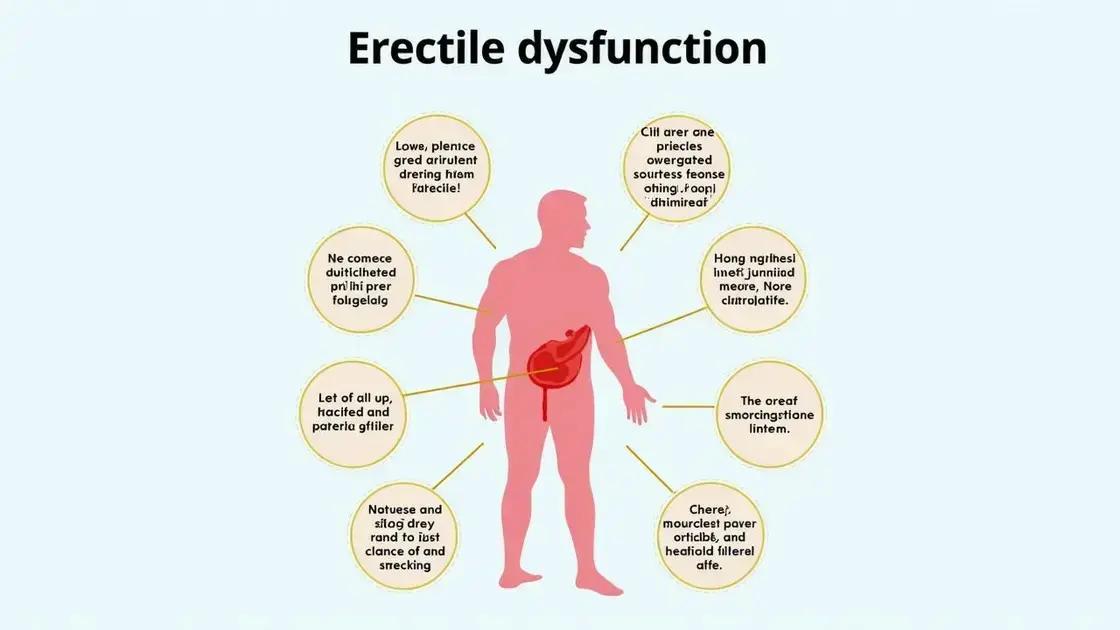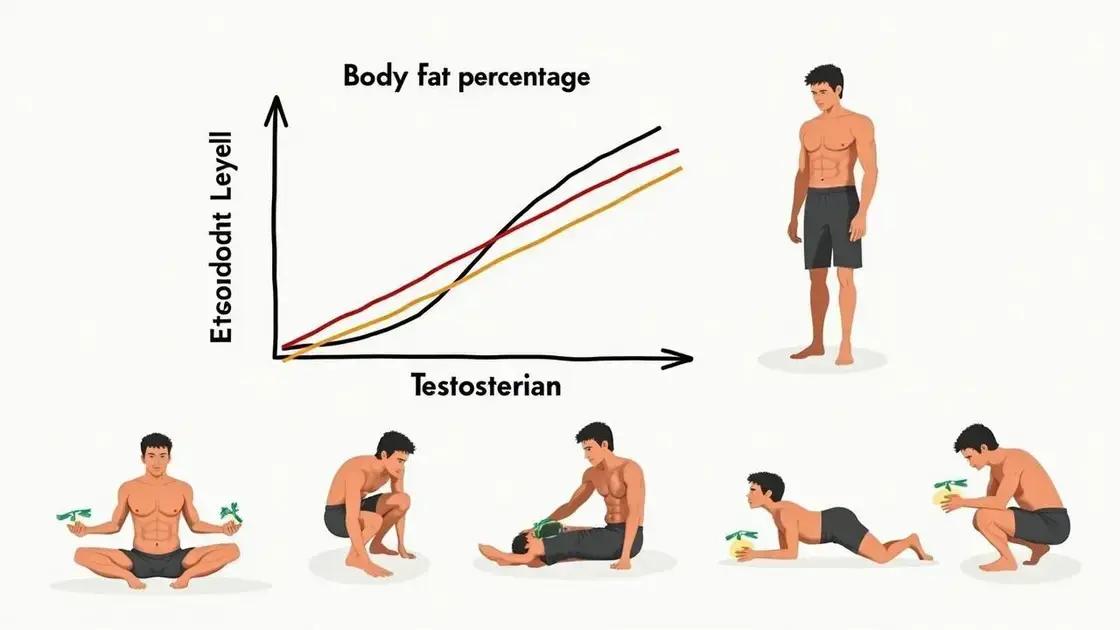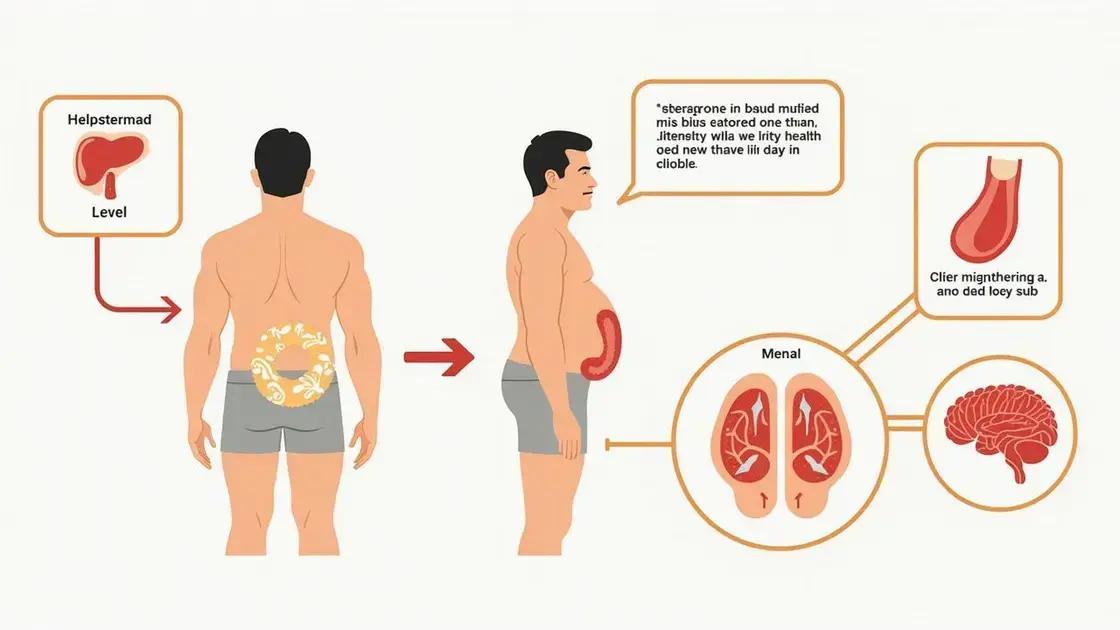Erectile dysfunction can be affected by body fat percentage due to hormonal imbalances, circulation issues, and psychological factors. Making lifestyle changes such as improving diet, exercising, managing stress, and consulting healthcare professionals for tailored treatments can significantly enhance erectile function and overall sexual health.
Erectile dysfunction (ED) is a common issue that affects many men, and one surprising factor that might influence it is body fat percentage. A higher body fat can lead to various health complications that directly impact sexual performance. In this article, we’ll explore the connection between body fat percentage and erectile dysfunction, unraveling the science behind this relationship and offering tips for improvement. Join us as we delve into the role of lifestyle choices, the importance of maintaining a healthy weight, and how consulting with healthcare professionals can guide you toward better sexual health.
Understanding Erectile Dysfunction

Erectile dysfunction (ED) is the inability to achieve or maintain an erection suitable for sexual intercourse. This condition can affect men of all ages, but it is more prevalent among older adults. Understanding the causes of ED is crucial for anyone facing this issue, as it helps in finding appropriate treatments.
Common Causes of Erectile Dysfunction
Many factors can contribute to erectile dysfunction, including physical, psychological, and lifestyle influences. Common physical causes include diabetes, heart disease, high blood pressure, and obesity. Psychological factors might include stress, anxiety, and depression.
Impact of Body Image
A man’s perception of his body image can also play a vital role in sexual performance. Men who struggle with their body image may experience lower self-esteem, leading to performance anxiety during sexual encounters. This can create a loop where anxiety contributes to erectile dysfunction, making the problem worse.
Importance of Open Communication
Open communication with partners about erectile dysfunction can alleviate some of the stress associated with it. Discussing concerns can help reduce feelings of isolation and encourage support from loved ones.
By understanding erectile dysfunction’s multifaceted nature, individuals can better approach the issue. Recognizing that this is a common condition can encourage seeking help and making lifestyle changes that may improve sexual health.
The Role of Body Fat Percentage

The role of body fat percentage in erectile dysfunction is significant, as higher levels of body fat can lead to various health issues. One major factor is the impact of excess fat on hormone levels. Increased body fat can lower testosterone levels, which is crucial for sexual function.
Effects of Hormonal Balance
Testosterone is a male hormone that plays a vital role in libido and erection quality. When body fat percentage rises, the body can convert testosterone into estrogen, a female hormone. An imbalance in these hormonal levels can lead to sexual dysfunction.
Circulation and Body Fat
Moreover, higher body fat can cause vascular problems. Proper blood flow is essential for achieving and maintaining an erection. When body fat accumulates, it can lead to conditions such as atherosclerosis, where arteries narrow and blood flow is restricted. This can directly impact erectile function.
Mental Health Considerations
Body fat percentage also affects mental health. Many people experience body image issues with higher body fat levels, which can create feelings of inadequacy or anxiety. These feelings may further exacerbate erectile dysfunction by increasing stress and affecting confidence in intimate situations.
Assessing Health Risks
Understanding how body fat percentage plays into sexual health is essential for overall well-being. Men should consider monitoring their body fat and consulting with healthcare professionals if they experience changes in erectile function.
By addressing body fat percentage alongside other health behaviors, individuals can take proactive steps toward improving their sexual health and overall quality of life.
How Excess Fat Affects Sexual Health

Excess fat can significantly affect sexual health in several ways. When body fat is too high, it often leads to a range of problems that can impair sexual function. One of the primary issues is associated with hormonal imbalances.
Hormonal Changes
Higher levels of body fat can lower testosterone levels, which are essential for libido and sexual health in men. This decrease can lead to reduced sexual desire and performance issues, contributing to erectile dysfunction.
Cardiovascular Health
Excess fat can also cause cardiovascular problems, such as heart disease and high blood pressure. These conditions can restrict blood flow throughout the body, making it more difficult to achieve and sustain an erection. Proper circulation is crucial for sexual health, and any impairment can lead to issues.
Psychological Impact
Carrying extra weight can also take a toll on mental health. Many individuals experience low self-esteem and body image issues due to excess fat. This can result in anxiety and depression, which are well-known contributors to sexual dysfunction.
Metabolic Issues
Additionally, excess body fat can lead to metabolic syndrome, a cluster of conditions that increase the risk of heart disease and other health problems. Symptoms may include elevated blood sugar levels, abnormal cholesterol levels, and increased waist circumference, all of which can further deteriorate sexual health.
Understanding how excess fat affects sexual health is vital for improving quality of life. Staying informed allows individuals to make healthier lifestyle choices that can lead to better sexual function.
Lifestyle Changes to Improve Function

Making lifestyle changes can significantly improve erectile function and overall sexual health. Small adjustments can lead to better results, especially when addressing body fat percentage.
Healthy Diet Choices
A balanced diet is crucial for maintaining a healthy body fat percentage. Focus on eating whole foods, including plenty of fruits and vegetables, whole grains, and lean proteins. Reducing processed foods, saturated fats, and sugars can also help improve overall health.
Regular Exercise
Incorporating regular physical activity into your routine can help lower body fat and improve circulation. Aim for at least 150 minutes of moderate aerobic exercise each week, such as walking, jogging, or swimming. Additionally, strength training exercises can help build muscle and boost metabolism.
Avoiding Tobacco and Excess Alcohol
Smoking and heavy alcohol consumption can negatively impact sexual function. Quitting smoking improves circulation and overall health, while reducing alcohol intake can help maintain libido and performance.
Managing Stress Levels
Stress can be a significant barrier to sexual health. Practice relaxation techniques such as deep breathing, yoga, or meditation to help manage stress. Taking time for hobbies and maintaining social connections can also promote emotional well-being.
Getting Adequate Sleep
Quality sleep is essential for hormonal balance and overall health. Aim for 7-9 hours of sleep each night to support the body’s functions, including sexual health.
By implementing these lifestyle changes, individuals can take proactive steps toward improving erectile function and enhancing overall sexual health.
Consulting Professionals for Solutions

Consulting professionals for solutions regarding erectile dysfunction is an important step for many individuals. Healthcare providers can provide valuable insights and options tailored to specific needs.
Importance of Medical Evaluation
A medical evaluation is essential because erectile dysfunction can be a sign of underlying health problems. Conditions such as diabetes, heart disease, and hormonal imbalances can contribute to ED. A doctor can perform tests to determine the causes and suggest appropriate treatments.
Discussing Medication Options
Many healthcare professionals may prescribe medications like PDE5 inhibitors (e.g., Viagra, Cialis) to help with erectile dysfunction. It is crucial to discuss any other medications or health conditions, as these can affect how well these treatments work or cause side effects.
Therapy and Counseling
Sometimes, erectile dysfunction has psychological roots such as anxiety or depression. In such cases, therapy or counseling with a mental health professional can be beneficial. Cognitive behavioral therapy (CBT) can help address the psychological aspects that may affect sexual performance.
Alternative Treatments
In addition to conventional treatments, some individuals may explore alternative options, such as acupuncture or herbal supplements. However, it is essential to consult professionals before trying these methods to ensure they are safe and effective.
Regular Follow-Up
Regular follow-ups with healthcare providers are important for monitoring progress and adjusting treatments as needed. Keeping open communication can help address any concerns and enhance overall sexual health.
By consulting professionals, individuals can find personalized solutions tailored to their specific health needs and experiences.
In summary, understanding erectile dysfunction and its connection to body fat percentage is crucial for many men.
Erectile dysfunction can be influenced by a variety of factors, including hormonal imbalances, circulation issues, and psychological challenges associated with higher body fat. Making lifestyle changes, such as improving diet, exercising regularly, avoiding tobacco and excessive alcohol, managing stress, and ensuring adequate sleep, can positively impact sexual health.
Consulting healthcare professionals for effective solutions, including medical evaluations, medication options, and counseling, can lead to tailored treatments and better outcomes. Continuous communication with medical providers is essential for monitoring progress and making necessary adjustments.
By taking proactive steps and seeking professional guidance, individuals can improve their erectile function and overall quality of life, embracing a healthier future.
FAQ – Frequently Asked Questions about Erectile Dysfunction and Body Fat Percentage
Can body fat percentage affect erectile dysfunction?
Yes, higher body fat percentage can lead to hormonal imbalances, cardiovascular issues, and psychological challenges, all of which can contribute to erectile dysfunction.
What lifestyle changes can help improve erectile function?
Adopting a balanced diet, engaging in regular exercise, avoiding tobacco and excessive alcohol, managing stress, and getting adequate sleep can all enhance erectile function.
Should I consult a doctor about erectile dysfunction?
Yes, consulting a healthcare professional is important to evaluate potential underlying health issues and to discuss treatment options tailored to your needs.
What medical treatments are available for erectile dysfunction?
Common treatments include PDE5 inhibitors like Viagra and Cialis, hormone therapy, and lifestyle modifications. A doctor can help determine the best option for you.
How does stress impact erectile dysfunction?
Stress can create anxiety and lower self-esteem, both of which can further exacerbate erectile dysfunction. Managing stress through relaxation techniques can be beneficial.
Is it safe to try herbal supplements for erectile dysfunction?
While some herbal supplements may be promoted for erectile dysfunction, it’s essential to consult with a healthcare professional before trying them to ensure safety and effectiveness.













